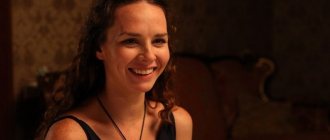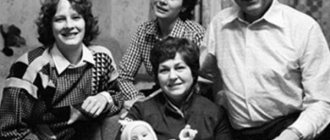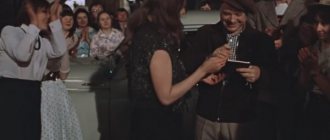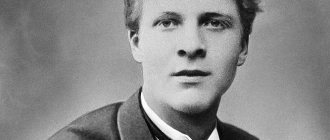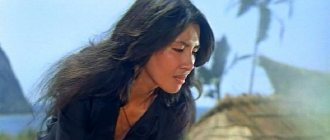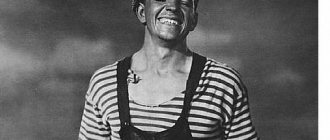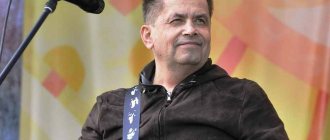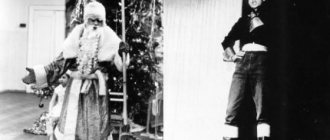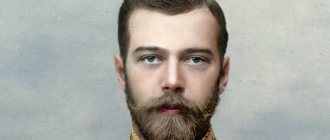Biography
Elina Bystritskaya was born on April 4, 1928 in Kyiv. Father - Bystritsky Abraham Petrovich, Honored Doctor, participated as a military doctor in the Civil and Great Patriotic Wars, buried in Vilnius. Mother - Bystritskaya Esther Isaakovna. Sister - Bystritskaya Sofya Avraamovna.
She spent her childhood and youth in Ukraine. Elina, (one of the two “l”s was lost by the passport officer), means “wise.” The parents took this name from the writer Knut Hamsun, not knowing how prophetically true it would be throughout their daughter’s entire life path.
Elina Bystritskaya had to overcome many sharp turns before the audience got to know and love her. Looking at Bystritskaya, it is impossible to imagine her outside the acting profession. Excellent appearance, beautiful voice, grace of movements - everything about her seems created for the stage and screen. But in her youth she was preparing for a different path in life: her father, a military doctor, believed that his daughter should inherit his profession. For many years, Elina herself thought that she should follow this path. Before the war, my father was assigned to Nizhyn. This is where the war found them. Father and mother worked in the hospital, which very soon became a front-line hospital. Just a girl, Elina decided that she also had to do something for the front, for victory. She asked to work at the hospital where her parents worked. Life on wheels, being thrown after units of the active army, bombings, shelling - all this made up her life in those years. Elina enrolls in nursing courses, first becomes a nurse, and soon masters the work of a laboratory assistant in a hospital clinical laboratory. The war hardened her. A person can do a lot - Elina understood this with particular clarity for the first time back then. And for the rest of her life she internalized her father’s credo: as a military man, he believed that decisions made must be carried out, obstacles must be overcome, and goals must be pursued with confidence. This became her life principles.
Among the many awards that crowned the merits of Elina Bystritskaya, there is the dear title “Son of the Regiment”, which she was awarded. The actress celebrated the 40th anniversary of the Victory with work, to which she paid tribute to the defenders of the Fatherland. “Random Waltz” was the name of the play based on the book by S. Aleksievich “War Doesn’t Have a Woman’s Face,” staged at the Variety Theater. Bystritskaya played eight roles in it, merging into a single portrait of women in the war.
In the fall of 1944, she returned to Nezhin (their house in Kyiv was destroyed) and entered the medical college. In 1947 she graduated from it, receiving a diploma with honors, which gave her the right to continue her studies at a medical institute. At the technical school, she takes part in amateur performances for the first time. And, having experienced the success of the audience, he begins to seriously think about the acting profession. The theater gene that has awakened in her haunts her. Realizing that the acting profession requires serious training, she enters the ballet class of a music school. At 19 it’s too late to be a ballerina. But Elina is sure that it is necessary to acquire plastic freedom in order to feel more comfortable on stage. Her first appearance on the professional stage of the Nizhyn Drama Theater in the play “Marusya Boguslavka,” where she danced oriental dance, further confirmed her decision to become an actress. Her parents were against her entering the theater. A military man, my father was accustomed to acting in a military manner. Arriving in Kyiv and meeting with the director of the theater institute, he made the only request - to explain to his daughter that she had nothing to do at the theater institute. Elina makes a compromise decision and enters the Nizhyn Pedagogical Institute. But a year later he leaves it for the theater.
Then there was the Kiev Theater Institute named after I.K. Karpenko-Kary, a meeting with wonderful teachers I.I. Chabanenko and L.A. Oleynik. After its successful completion in 1953, he spent three seasons at the Vilnius Russian Drama Theater. Here she had her first success in the roles of Tanya in the play of the same name and Olga (“Years of Wandering”) by A. Arbuzova, Varya Belaya (“Port Arthur” by I. Popov and A. Stepanov), Claudia (“The Tale of a Real Man” by B. Polevoy) and others.
Thoughtfulness, clarity in work, striving for completeness of form - these qualities were already evident in the young actress. The theater was on tour in Leningrad when Bystritskaya was invited to play two film roles at once. Her choice was unexpected: the actress preferred her contemporary, the doctor Elizaveta Maksimovna, to Shakespeare’s Viola and Sebastian (“Twelfth Night”) in the film “The Unfinished Tale.” Both in “Tana” and in “Years of Wandering” she also played doctors, knowing the people of this profession well from the front-line evacuation hospital. The actress was attracted by the opportunity to work under the guidance of the outstanding director Friedrich Ermler, who was also a talented teacher, next to such master actors as: Erast Garin, Evgeny Samoilov, Sofya Giatsintova, Sergei Bondarchuk. It was then that she truly understood what a profession was. The film “The Unfinished Tale” (1955) was released shortly after the war. The wounds had not yet healed, the hearts had not yet thawed from the trials of wartime, the stronger was the thirst for kindness and beauty in people. Having understood and felt this, the actress endowed her heroine with amazing light and personal charm. I wanted to imitate Bystritskaya in the role of Elizaveta Maksimovna. And they imitated... How many newborns were named Elina then, how many girls then went to enroll in medical universities. According to a survey by the newspaper “Soviet Culture”, Elina Bystritskaya was recognized as the best actress of the year.
This role brought her international fame. In 1955, as part of a delegation of filmmakers, she went to the first Soviet Film Week in Paris. She learned a lot from meetings with legends of the world screen: Yves Montand and Simone Signoret, Michelle Morgan and Gerard Philip, writers Elsa Triolet and Louis Aragon, artist Nadezhda Léger. This trip was the fruit of many thoughts. And although the French audience received her well, she understood what a difficult path to perfection she had to go through in order to win the title of “star”.
In those days, fate gave her a meeting with F.G. Ranevskaya. For the play “White Lotus”, where Ranevskaya was to play the main role, they could not find a young heroine. A chance meeting of two actresses at the House of Cinema - and Ranevskaya suggests that the management take Elina Bystritskaya for this role. So she ended up in the A.S. Pushkin Theater. But this work did not take place. Filming of “Quiet Don” began and after its completion, being registered at the theater for six months, Bystritskaya did not return there.
Bystritskaya learns in Paris that Sergei Gerasimov is starting to film Sholokhov’s “Quiet Flows the Don”. She dreamed of the role of Aksinya for a long time, from drama school. Returning to Moscow, she came to Gerasimov, who had begun acting tests, being already famous, even famous, and naively, boldly and fearlessly said: “I want this role. I can play it." The auditions took six months. Finally, Sholokhov himself recognized Aksinya Bystritskaya. After approval for the role of Aksinya, according to Elina Avraamovna, her most important path in art began.
On the set of “Quiet Don” she took a mastery course from Gerasimov. He demanded absolute external and internal transformation and helped her better understand her own capabilities. S. And Gerasimov demanded maximum truth even in small things. The specific dialect and habits seemed to have been passed on to Aksinya-Bystritskaya by many generations of Cossacks. When the film was released, thirty elders of the Don Cossacks suggested that the actress be called Aksinya Donskaya! She replied that she would keep her parents’ surname, but would remain devoted to the Cossacks. For this role, Elina Bystritskaya was awarded the title of Honorary Cossack.
The role in “Quiet Don” (1957-1958) became a real victory for the actress, her finest hour. But for a long time she tried each new work against “Gerasimov’s” criteria and assessments: would he like it, would Sergei Apollinarievich approve?
In the early 60s, together with Cherkasov, Merkuriev and Bondarchuk, Bystritskaya was invited to the United States to the White House and received the attention of the wife of President Eisenhower. An American fashion house offered her a toilet in which she was to be photographed for America magazine. But Bystritskaya was “vigilant” and, like a true Soviet woman, refused, which she recalls with humor today.
She received offers to act in films from abroad. But they all settled in the Union of Cinematographers.
Without success in cinema, Elina Avraamovna would never have decided to come to the Maly Theater. In 1958, her long-time dream came true - she was accepted into the troupe of the famous Maly Theater. Her debut was the role of Lady Windermere ("Lady Windermere's Fan" by O. Wilde, 1959), later in 1965 she played Mrs. Earlene in this play. She was “Wilde”, as if she sensed his bitter irony, managing to reveal the sincerity of her heroine’s feelings. Only many years later did we understand what high praise was contained in the modest words of the oldest theater actress AA Yablochkina about her, a debutante: “I understood everything that she said and did.” The fame of the film actress remained beyond the threshold. I had to take the exam for artistic maturity again - at a new stage. The “old men” of the Maly Theater, whom she revered, were still alive and working. With the great Vera Nikolaevna Pashenna and Elena Nikolaevna Gogoleva, the young actress played in the play “The Island of Aphrodite” by A. Parnis. Communication with such outstanding partners as Mikhail Tsarev, Elena Gogoleva, Nikolai Annenkov, Mikhail Zharov, Elena Shatrova and many others helped. She had the opportunity to work with wonderful directors: Boris Babochkin, Leonid Varpakhovsky, Pyotr Fomenko, Viktor Komissarzhevsky, Boris Lvov-Anokhin and others. She never considered it shameful to learn from them. And this is her lucky gift, which coincides with her natural acting talent.
Bystritskaya's works in the theater are always distinguished by plastic precision, completeness of form, the ability to master words perfectly, and her inherent artistic will allows her to be undeniably and unfadingly beautiful on stage. She has a special gift - the gift of stage beauty, while endowing the heroines with her mind, her intellect. Whatever roles Bystritskaya plays in the Russian and Western repertoire, her heroines are bright, extraordinary personalities. Among them: Lydia (“Mad Money”) and Glafira (“Wolves and Sheep”) by A.N. Ostrovsky, Gorky’s Yulia Filippovna (“Summer Residents”), Sofya Markovna (“Old Man”), Pelageya (“Foma Gordeev”), Baroness Strahl (“Masquerade” by M. Yu. Lermontov), Anna Petrovna (“Ivanov” by A. P. Chekhov), Duchess of Marlborough (“A Glass of Water” by E. Scribe), Paula Clotilde Clausen (“Before Sunset” by G. Hauptmann), Ksenia Ivanovna (“The Chamber”) and Martynova (“The Main Role”) in plays by S. Aleshin, Panov (“Yarovaya Love” by K. Trenev), Maria (“Choice” by Yu. Bondarev), Mary (“Long Day Journeys into Night” "Yu. O'Neil), Otradin and Kruchinina ("Guilty Without Guilt" by A.N. Ostrovsky), Moskaleva ("Uncle's Dream" by F. M. Dostoevsky) and others.
Many of Bystritskaya’s creations have received public recognition. But what is especially dear to the actress is the review of her work in the play “Masquerade” (directed by L.V. Varpakhovsky) by composer Igor Stravinsky, who came to Moscow in 1962 and appreciated her Baroness Shtral as sounding musical in the play. Lermontov remains one of the actress’s favorite poets to this day.
At the Maly Theater there are traditions in performing roles in Ostrovsky's plays. E.A. Bystritskaya managed not only to preserve them, but also to introduce her own style into the performing style in the plays “Wolves and Sheep” and “Mad Money”. “The image of Lydia, created by Bystritskaya, will take an independent place in the stage history of “Mad Money” over the last decade,” wrote the famous critic B.V. Alpers. “He has the necessary integrity and complexity that is very rarely achieved by performers of this role.”
Unexpectedly, the actress played the role of Yulia Filippovna in “Summer Residents,” created in collaboration with the wonderful actor and director Boris Babochkin. This role became one of the peaks of the actress’s creativity.
The name Bystritskaya became a legend. She captivated our compatriots in the 50s, and continues to captivate and delight today. Her life had everything: rapid ups, tragic years of downtime, searches, expectations. And here again the meeting of the audience with their favorite actress. In honor of the 850th anniversary of Moscow in Kolomenskoye, in the performance “The Gallant Age,” Bystritskaya brightly, with her characteristic brilliance and skill, subtle and sometimes poignant character, appeared before the public in the guise of Catherine the Great, showing her heroine in different guises of her life: sometimes in the role an intelligent and perspicacious ruler, sometimes in the role of a mother queen, having fun and dancing at the wedding of her subjects, sometimes in the form of a woman to whom nothing human is alien.
The world of theater knows the concept of “great actresses”, Bystritskaya is among them. Nature endowed her not only with talent, but with the fortitude to preserve herself and her gift under all the trials of fate. Bystritskaya always needed a director who not only understood and appreciated the power of her talent, but also was ready to meet her halfway. This meeting with director and partner Vladimir Andreev took place at a performance with the symbolic title for Elina Bystritskaya “Crossroads” by L. Zorin on the stage of the M.N. Ermolova Theater. When Bystritskaya was on stage, the audience felt a special breath... Time had no power over her. She was always beautiful, special - regal beauty. E. Bystritskaya tuned the entire performance according to her tuning fork, filling it with unpredictability and virtuosity of acting manifestations, changing and mixing colors, moods, shades of behavior, proving once again how many new possibilities talent conceals.
E.A. Bystritskaya generously shared her creative experience with young people. She was a professor, taught at the acting department at GITIS named after A.V. Lunacharsky, at the Theater School named after. M.S. Shchepkina.
Still from the film "Quiet Don"
Over the years of theatrical activity, Elina Bystritskaya starred in more than ten films, some of which became classics of Soviet cinema. She was invited to work by such outstanding directors as Sergei Gerasimov, Friedrich Ermler, Mikhail Romm, Yuri Egorov, Grigory Nathanson, Grigory Alexandrov and others. In addition to “The Unfinished Tale” (1955) and “Quiet Don” (1957-1958), the actress’s most famous works are in the films: “In Days of Peace” (Lena Alekseenko, 1950), “The Bogatyr” Goes to Marto” ( radio operator Sergeeva, 1954), “Volunteers” (Lelya, 1958), “Russian souvenir” (Pandora Montesi, 1960), “Everything remains for the people” (Ksenia Rumyantseva, 1963), “Unquenchable Flame” ( 1964), “Nikolai Bauman” (M.F. Andreeva, 1968), etc.
Children of Elina Bystritskaya
The children of Elina Bystritskaya are the students whom she has been teaching since 1978 at GITIS named after Lunacharsky, and her husband’s children from his first marriages. Unfortunately, the great actress has no children of her own. In her youth, doctors gave Bystritskaya a disappointing diagnosis - infertility. This is how the result of her difficult childhood affected the girl. Working in a hospital, a thirteen-year-old child had to carry seriously wounded soldiers on stretchers, along with adults.
Elina Avraamovna loves animals, especially dogs. She remembers a mongrel from her childhood, whom she brought home, washed and fed. Then she had a dog named Wolf, who lived in the actress’s house for three years. Due to a busy work schedule, she had to give it up. Bystritskaya still remembers the eyes of the shepherd when she was taken away.
The Pekingese Fifa has been living with the teacher for many years. The dog is devoted to its owner and really doesn’t like it when she leaves her alone. Together they like to watch programs about tailed animals.
Social activity
E.A. Bystritskaya, a person of a lively social temperament, is not confined to her narrow professional interests. She didn't know what indifference was. And no matter what she did, no matter what the actress did outside the theater, she put her soul and heart into everything. E.N. Gogoleva introduced her to public work, first in the theater trade union committee, then to military patronage work in the All-Russian Theater Society (today the Union of Theater Workers). In the period 1975-1992. she is the president of the USSR Rhythmic Gymnastics Federation. These years were the heyday of this sport, largely thanks to Elina Bystritskaya. Through her efforts, rhythmic gymnastics was included in the program of the Spartakiad of the Peoples of the USSR. The task of bringing gymnastics to the Olympic platform was completed.
And in public life E.A. Bystritskaya remained a creative person. We can list only some of her public positions: Member of the Commission on Culture under the President of the Russian Federation, member of the International Commission on Population Health under the Security Council of Russia, member of the Presidium of the Academy of Russian Art, academician of the Russian Academy of Natural Sciences, academician of the International Academy of Information Processes and Technologies, full member of the Academy Energy Information Sciences, World Elite Academy. She recently created the “Center for the Spiritual and Physical Improvement of Women” and was elected vice-president of the International Foundation for Maternal and Child Health.
In June 1994 Elina Bystritskaya, understanding the difficulties the country is experiencing in the economic sphere, decided to support culture by attracting non-state funds to this area of knowledge and spirituality. She established a charitable foundation in support of art and science to help university students and students of music schools. In 1995 Among the leaders of the socio-political Movement “Stable Russia”, she was nominated for deputies of the State Duma of the Federal Assembly of the Russian Federation.
Family of Elina Bystritskaya
Elina Bystritskaya’s family - no matter how stupid it may sound - consists of one person - her alone. You shouldn’t immediately think that everyone forgot the great theater and film actress and left her alone. No, that's not true. Bystritskaya has a sister - Shegelman Sofia Avraamovna. She got married a long time ago and now lives abroad in Israel.
Elina herself does not consider herself lonely and unhappy. She has many friends, she has learned to enjoy life, to notice something interesting around her every day. Old age does not prevent her from continuing to perform on the stage of the Maly Theater and play excellent billiards.
Personal life
While still a student, Elina Bystritskaya met the actor of the Lesya Ukrainka Theater Kirill Lavrov. An affair began between them, and they decided to get married immediately after she graduated from college - the wedding was scheduled for the summer of 1953. But one day Lavrov was leaving on business, and Bystritskaya, without warning, decided to see him off at the station. There she saw that the young man was being escorted by another girl. The actors broke up. Kirill Lavrov married that girl, actress Valentina Nikolaeva, and Bystritskaya many years later married an official from the Ministry of Trade.
Height, weight, age. How old is Elina Bystritskaya
Height, weight, age, how old is Elina Bystritskaya? Many generations have been asking this question. The actress looks great at 90 years old. Physical activity and proper nutrition help her stay in great shape throughout her life. In her youth, the actress practiced ballroom dancing to gain lightness and graceful posture.
Elina Bystritskaya's photos in her youth and now differ significantly: gray hair, a network of wrinkles around the eyes and lips. Be that as it may, she remains the same cheerful and positive person as many years ago. Elina Avraamovna believes that loving life is her direct responsibility, because the audience on stage feels the actors like no one else.
Theater works
Vilnius Russian Drama Theater
1953 - “Tanya” by A. N. Arbuzova - Tanya 1953 - “Port Arthur” by I. F. Popov and A. N. Stepanov - Varya 1954 - “Years of Wandering” by A. N. Arbuzova - Olga “The Tale of a Real Man” "by B. N. Polevoy - Claudia "The Scarlet Flower" by S. T. Aksakov - Alyonushka
Moscow Drama Theater named after M. N. Ermolova
1998 - “Crossroads” (“Warsaw Melody-98”) L. G. Zorina - She
Maly Theater
1959 — “Lady Windermere’s Fan” by O. Wilde. (Lady Windermere) 1960 - “Autumn Dawns” by V. Blinov. (Natalia) 1960 - Nina. “House of Cards” by O. Stukalov. 1961 - Cleopatra Gavrilovna. “Why the stars smiled” by A. Korneychuk. 1961 - Katerina Remez. “Wings” by A. Korneychuk. 1961 - Paranka. “Spring Thunder” by Dmitry Zorin. 1962 - Baroness Strahl. “Masquerade” by M. Yu. Lermontov. 1963 - Ksenia Ivanovna. “Chamber” by S. Aleshin. 1964 - Yulia Filippovna. “Summer Residents” by M. Gorky. 1964 - Maria Ivanovna. “The main role” by S. Aleshin. 1965 - Mrs. Earlene. "Lady Windermere's Fan" by O. Wilde. 1965 - Elsa “Hero of the Fatherland” by L. Kruchkovsky. 1966 - Glafira. “Wolves and Sheep” by A.N. Ostrovsky. 1966 - Duchess of Marlborough. “Glass of Water” by E. Scribe. 1967 - Anna Petrovna. “Ivanov” by A. Chekhov. 1968 - Sofya Markovna. “The Old Man” by M. Gorky. 1969 - Lydia, “Mad Money” by A.N. Ostrovsky 1970 - Anastasia. “Confession” by S. Dangulov. 1971 - Donna Anna. “The Stone Master” by L.Ukrainka. 1972 - Paula Clotilde. “Before Sunset” by G. Hauptmann. 1973 - Masha. “Killer Whale” by A.N. Tolstoy. 1977 - Panova. “Yarovaya Love” by K. Trenev. 1981 - Pelageya. “Foma Gordeev” by M. Gorky. 1981 - Kruchinina (Otradina) “Guilty Without Guilt” by A.N. Ostrovsky. 1982 - Maria. “Choice” by Yu. Bondarev. 1989 - Mary. “Long Day's Journey into Night” by Y.O'Neill. 1992 - Moskaleva. “Uncle's Dream” according to F.M. Dostoevsky. 2000 - Khlestova. “Woe from Wit” by A.S. Griboyedov. 2002 - Turusina. “Simplicity is enough for every wise man” by A.N. Ostrovsky. 2007 - Lady Kitty Champion-Cheney. "Love Circle" by S. Maugham
The beginning of an acting career
After the first year, Elina was approved for the major role of doctor Elena in the film “In Peaceful Days.” The inexperienced girl beat many famous actresses. On the set she met other young actors: Georgy Yumatov and Vyacheslav Tikhonov.
Still from the film “Peaceful Days”
Then there were roles in the adventure film “The Bogatyr Goes to Marto” and in the drama “The Unfinished Tale,” where Elina starred with Sergei Bondarchuk, whom, despite the tender feelings between their characters, she did not like because of his arrogant disposition. Even when Elina was filming Taras Shevchenko, the actor publicly humiliated her in front of visitors to the film studio buffet.
“An Unfinished Tale”: Elina Bystritskaya and Sergei Bondarchuk
After graduating from university, Elina was assigned to the Kherson Drama Theater. However, due to disagreements with the director, with the support of Ivan Chabanenko, the actress achieved enrollment in the troupe of the Theater. Mossovet under the leadership of Yuri Zavadsky. Alas, Bystritskaya had enough ill-wishers, and they did their best to ensure that the road to the capital’s theaters was closed to the young actress. And they succeeded. But Elina was welcomed into the Vilnius Drama Theater with open arms.
Filmography
Movie
1950 - In days of peace - Lena Alekseenko 1951 - Taras Shevchenko - episode 1954 - “The Bogatyr” goes to Marto - Zhenya Sergeeva, radio operator 1955 - An unfinished story - Elizaveta Maksimovna 1958 - Quiet Don - Aksinya 1958 - Volunteers - Lelya 1960 - Russian souvenir - Maria Pandora (Barbara) Montesi 1963 - Everything remains for people - Ksenia Rumyantseva 1964 - Unquenchable flame - Glasha 1966 - Summer residents - Yulia Filippovna Suslova 1967 - Nikolai Bauman - Andreeva 1990 - Moscow policeman Kaminsky - Ivanovna 1991 - Seven days after the murder - Kira Alexandrovna 1992 - Farewell tour - train passenger 1993 - Brave guys - Nadezhda, Cherednichenko's wife 2002 - Babi Yar - Eleanor 2004 - Saga of the ancient Bulgars. Vladimir's Ladder Red Sun - Princess Olga 2005 - Saga of the Ancient Bulgars. The Legend of Olga the Saint - Princess Olga 2006 - Return of Mukhtar - Alina Stanislavovna
Teleplays
1973 - Wolves and Sheep - Glafira 1974 - Ostrovsky House - Glafira 1974 - Old Man - Sofya Markovna 1976 - Confession - Anastasia 1978 - Mad Money - Lydia 1983 - Foma Gordeev - Pelageya 1985 - Guilty Without Guilt - Kruchinina 2002 - Woe from Wit - Khlestova 2008 - Love Circle - Lady Kitty Champion-Cheney 2008 - Enough simplicity for every wise man - Sofya Ignatievna Turusina
Choice of profession
The family had no doubt that the eldest daughter would become a doctor.
But Elina secretly dreamed of something completely different - she wanted to become an actress. But how to approach parents, especially father, with this? And indeed, Abraham Petrovich did not want to hear anything. The maximum he could do was to allow his daughter to enter the Nizhyn Pedagogical Institute. But the girl did not intend to give up her dream. In order not to lose face in front of the examiners, she learned to recite poetry and prose and tried to sing. In an effort to master the art of moving beautifully on stage, the girl enrolled in a ballet class. At this age it is too late to become a ballerina, but purposeful Elina completed the five-year program in six months. At the same time, the younger sister remained completely in her care: her father went on leave to Dresden and took his seriously ill wife with him.
Elina Bystritskaya never gave in to difficulties
On her initiative, a drama club was opened at the pedagogical institute. After one of the performances, an unknown lady approached Elina and asked: “Are you studying at the theater school?” “No, in pedagogical,” Elina answered, to which she received the answer: “In vain. You need to go to the theater." This moment became a turning point, Elina realized it was time. With pennies in her pocket and a couple of loaves of bread, which were given to her by her parents, who had resigned themselves to their daughter’s wishes, Bystritskaya boarded the train that took her to Kyiv. She managed to enter the film department of the Kyiv Theater Institute. Karpenko-Kary, on the course of Ambrose Buchma.
From the first days of her studies, the student began to look for an opportunity to earn money: she lived in her grandmother’s room, but there was not enough money for food. One day she found herself on the set of the film “Taras Shevchenko” and asked to be an extra. She played a tiny role as a maid in the film. Then Elina got a job in the Kyo family circus troupe as an aerialist. The circus performers worked with insurance, but Elina was terrified of heights, and yet she overcame her fear and performed with the circus throughout the season.
Despite the fact that both her classmates and teachers loved the bright, open, excellent student, Elina faced the threat of expulsion. It all started with a trifle: a classmate sneaked up to her in the corridor with a whistle in his mouth and whistled right in the girl’s ear. Ever since front-line times, Elina was afraid of loud noises and reflexively slapped the guy in the face. News of the seemingly minor incident instantly spread throughout the university. Here and there in student conversations, Elina heard her name being accompanied by the word “Jewish” (in fact, the politically correct and rude word not was used, but for ethical reasons we will not use it here). The “fifth point” overshadowed the management of all the previous successes of the gifted student; no one wanted to understand the reasons why Elina hit her classmate. But exclusion was still avoided.
Elina Bystritskaya. The Iron Lady But when Joseph Stalin was found dead on March 1, 1953, and rumors spread throughout the country that the death of the leader of nations was the work of Zionist enemies, Elina again almost became a victim of oppression because of her nationality. They remembered the slap in the face, and trumped-up sins like giggling at a meeting, and wanted to take away her Komsomol card by force. The teacher, Ivan Chabanenko, stood up for the girl. If it weren’t for his help, we would have had to say goodbye to the university.
Titles and awards
Elina Bystritskaya was crowned with the highest acting titles and many awards. She is the People's Artist of the USSR, the People's Artist of Georgia, the People's Artist of Azerbaijan, the People's Artist of Kazakhstan, a holder of the Order of Merit for the Fatherland, 1st and 2nd degree, the October Revolution, the Red Banner of Labor, and two orders of the Badge of Honor. He has a Letter of Gratitude from the President of the Russian Federation B.N. Yeltsin for his contribution to the formation of Russian democracy, as well as a Letter of Gratitude from N.S. Mikhalkov for many years of conscientious work and great contribution to the development of Russian cinema. At the annual Russian film festival “Women of Cinema”, dedicated to the great Russian actress Vera Kholodnaya, held in 1998, E.A. Bystritskaya was awarded the Diploma “Vera Kholodnaya Prize - Seven Beauties of Cinema” (for roles in film and life) in the category “Most Feminine”.
As a veteran of the Great Patriotic War, she was awarded the Order of the Patriotic War, II degree, the medal “For Victory over Germany,” and many anniversary medals.
Honorary titles
1962 - Honored Artist of the RSFSR 1966 - People's Artist of the RSFSR 1978 - People's Artist of the USSR - People's Artist of the Georgian SSR - People's Artist of the Azerbaijan SSR - People's Artist of the Kazakh SSR
Awards
2006 - Russian Federation Government Prize in the field of culture - for the play based on the play by A. N. Ostrovsky "Simplicity is enough for every wise man" 2000 - Moscow Mayor's Prize in the field of literature and art - for playing the main roles in the play "Crossroads" based on the play by L. Zorin at the Moscow Theater - Center. M. N. Ermolova
Orders
2008 - Order of Merit for the Fatherland, 1st class - for outstanding contribution to the development of domestic theatrical and cinematic art, many years of creative activity 1998 - Order of Merit for the Fatherland, 2nd class - for great contribution to the development of national culture and art 2020 - Order “For services to the Fatherland” III degree - for a great contribution to the development of domestic culture and art, many years of fruitful activity 1988 - Order of the October Revolution - for services in the development of Soviet theatrical art 1985 - Order of the Patriotic War II degree - for courage, fortitude and courage, shown in the fight against the Nazi invaders, and in commemoration of the 40th anniversary of the victory of the Soviet people in the Great Patriotic War of 1941-1945 1974 - Order of the Red Banner of Labor 1960 - Two Orders of the Badge of Honor - in commemoration of the 50th anniversary of International Women's Day and noting the active participation of women of the Soviet Union in communist construction and their services to the Soviet state in educating the younger generation, for achieving high standards in work and fruitful social activities.
Medals
Medal "In Commemoration of the 100th Anniversary of the Birth of Vladimir Ilyich Lenin" Medal "For Victory over Germany in the Great Patriotic War of 1941-1945" Medal "Twenty Years of Victory in the Great Patriotic War 1941-1945" Medal "Thirty Years of Victory in the Great Patriotic War 1941-1945" Medal "Forty Years of Victory in the Great Patriotic War 1941-1945" Medal "50 years of Victory in the Great Patriotic War 1941-1945" Medal "60 Years of Victory in the Great Patriotic War 1941-1945" Medal "65 Years of Victory in the Great Patriotic War 1941-1945" Medal "70 Years of Victory in the Great Patriotic War 1941-1945" Zhukov Medal Medal "For Valiant Labor in the Great Patriotic War 1941-1945." Medal “Veteran of Labor” Medal “In Memory of the 850th Anniversary of Moscow” Medal “80 Years of the Komsomol”
Incentives
2004 - Gratitude of the President of the Russian Federation - for great services in the development of theatrical art 1999 - Gratitude of the President of the Russian Federation - for great services in the development of theatrical art and in connection with the 175th anniversary of the theater 1996 - Gratitude of the President of the Russian Federation - for active participation in the organization and conduct of the election campaign President of Russia in 1996
Regional awards
2013 - Order of Merit for the Rostov Region - for great contribution to the development of culture and many years of fruitful creative activity
Public awards
1998 — Diploma “Vera Kholodnaya Prize - Seven Beauties of Cinema” (for roles in cinema and life) in the category “Most Feminine” 2000 — International Film Festival of Film Actors “Constellation” (Prize “For Outstanding Contribution to Russian Cinema”) 2001 — National Public Award recognition of the achievements of women in Russia "Olympia" of the Russian Academy of Business and Entrepreneurship 2002 - Prize "Triumph" 2003 - Prize "Idol" in the nomination "For high service to art" 2004 - Prize "Treasury of the Motherland" (magazine "Rodina") 2009 - Prize "Star" Theatrical" in the category "Legends of the Stage" 2013 - International Award "Faith and Loyalty" (Foundation of the Holy All-Praised Apostle Andrew the First-Called) - for tireless creative service, acting and active social activities 2013 - National Award "Russian of the Year" - Honorary Cossack, Colonel Cossack troops, has the right to bear arms. 2020 - Laureate of the Russian national theater award "Golden Mask - 2019" - for outstanding contribution to the development of theatrical art.
Childhood and youth
Elina Bystritskaya was born on April 4, 1928 in the city of Kyiv into a family of doctors. Her father was a military doctor, and her mother Esir Isaakovna worked as a cook in a hospital. From an early age, she was surrounded only by medical workers, so the girl’s favorite game was treating dolls. After the start of the war, Elina took short-term nursing courses.
This allowed her to work as a nurse in a front-line hospital, and then she moved to a laboratory. At the same time, the girl passed exams for the 6th and 7th grades of school in order to be able to study further.
After returning to Kyiv, the family learned that a bomb had hit their house and destroyed all their belongings. I had to go to Nezhin, where they lived before the war. There, the future actress entered a medical college. Six months before receiving her diploma, Elina was asked to participate in amateur performances. It was a vaudeville in which the girl got the role of a young lady.
After the end of the performance, many came up and thanked Bystritskaya for her talented portrayal. In 1947, she received the coveted diploma, but by that time she had firmly decided that she would not go into medicine. According to Elina Avraamovna, she was simply afraid of the responsibility that the medical profession requires.
Theater
After college, Bystritskaya was assigned to the Kherson Drama Theater, but Elina refused to work there because the director took liberties with the actress. One of the teachers helped Bystritskaya get a job at the Mossovet Theater, but the actress did not have the chance to perform on its stage - there were “well-wishers” who flooded the theater management with complaints.
The theatrical biography of Elina Bystritskaya began in Vilnius. On the stage of the city drama theater she played Varya in the play “Port Arthur”, Olga in the production of “Years of Wandering” and Alyonushka in “The Scarlet Flower”. Bystritskaya dreamed of playing on the capital's stage, but for many years this dream was not destined to come true. Faina Ranevskaya interceded for the promising actress - in vain.
Only after the release of the film “Volunteers” did Bystritskaya manage to move to Moscow and get a job at the Maly Theater. She devoted her whole life to him. Spectators enjoyed watching her play in the plays “Woe from Wit”, “Masquerade”, “The Main Role”, “Summer Residents” and others.
